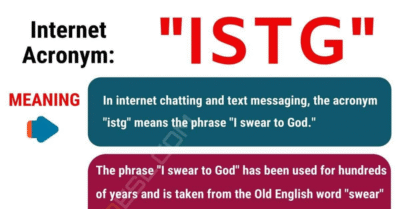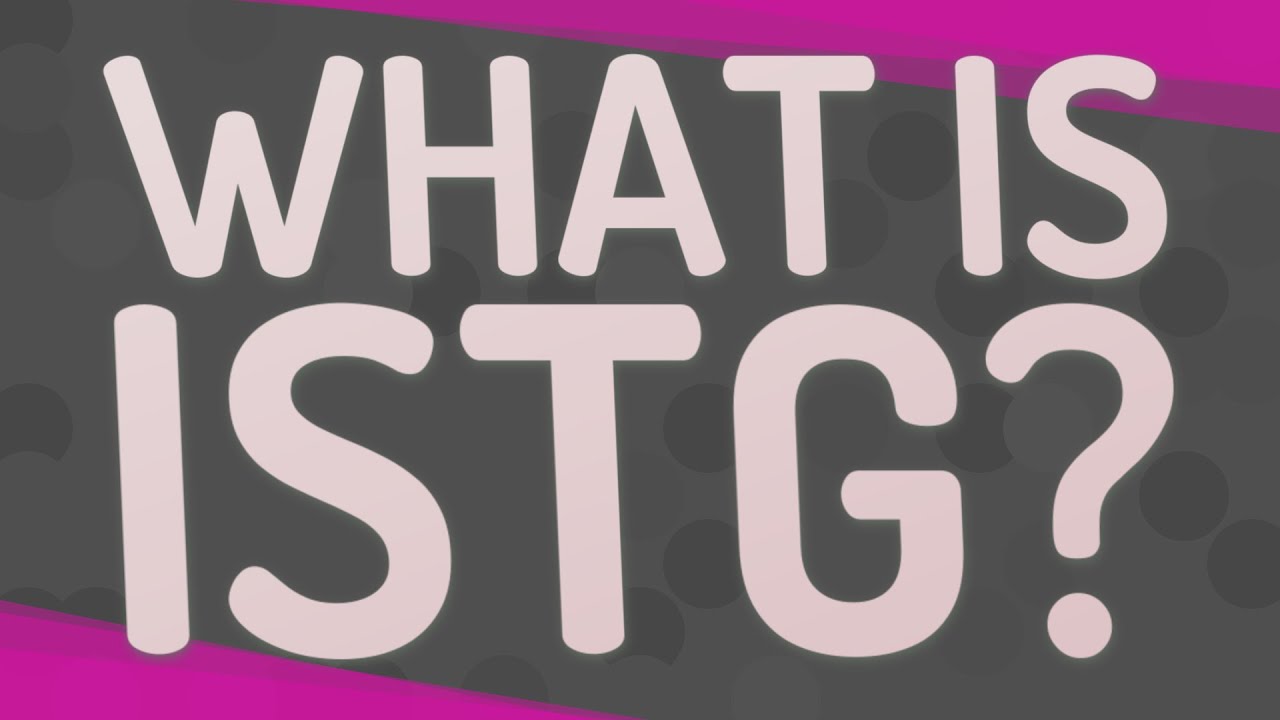Every generation has its own slang. From the groovy “far out” of the 70s to the sarcastic “whatever” of the 90s, language evolves with people, trends,
Every generation has its own slang. From the groovy “far out” of the 70s to the sarcastic “whatever” of the 90s, language evolves with people, trends, and technology. In the digital era, slang has taken on a new life—faster, shorter, and more expressive. One term that has risen to internet fame is ISTG. If you’ve ever stumbled upon this abbreviation in a text, tweet, or TikTok comment, you might have wondered: What does ISTG mean?
In this article, we’ll unpack the meaning of ISTG, its origins, its cultural role, and how it has become more than just a shorthand. We’ll also explore how it reflects emotion, builds connection, and sometimes sparks controversy—all in just four letters.
Must visit: trustedhealthcare

A Simple Definition: What Does ISTG Mean?
ISTG is an acronym that stands for:
“I Swear to God.”
It’s used to convey intensity, honesty, frustration, or emotion in informal communication. The phrase is not new—it’s been around for centuries—but the abbreviated form has found a new home in texting, memes, and modern digital language.
What Does It Imply?
When someone says ISTG, they are expressing either:
- A serious promise or claim
- Deep frustration
- Strong disbelief or shock
- Passionate agreement or excitement
Think of it as emotional punctuation—something that adds weight to a statement.
The Rise of ISTG in Internet Culture
To understand ISTG, it’s helpful to understand how internet slang works. Words and phrases evolve quickly online. Platforms like Twitter (X), TikTok, Snapchat, and Discord are where slang spreads, mutates, and sometimes goes viral.
ISTG first started gaining popularity in text messages and early social media. By the mid-2010s, it was being used widely by teens and young adults. With the rise of Gen Z content creators on TikTok and Instagram, ISTG went from casual slang to cultural shorthand.
Why does it work so well?
- It’s short.
- It’s emotionally charged.
- It sounds natural.
- It fits in memes, captions, and tweets.
Today, ISTG is everywhere, used by millions of people across cultures and platforms.
Real-World Examples of ISTG in Action
Let’s take a look at how ISTG is actually used in conversation.
1. Making a Serious Point
“ISTG I’m not lying about this, it really happened.”
Here, the speaker uses ISTG to defend their honesty.
2. Reacting to Something Unbelievable
“ISTG that was the weirdest thing I’ve ever seen on TikTok.”
In this case, ISTG highlights surprise and disbelief.
3. Expressing Anger or Frustration
“ISTG if my alarm doesn’t go off tomorrow, I’m done.”
The person is venting annoyance or concern.
4. Adding Dramatic Flair
“ISTG this coffee just saved my life.”
Obviously, the speaker isn’t serious about life and death—it’s playful exaggeration, a common use in social media storytelling.
The Emotional Power of ISTG
What makes ISTG so interesting is how much emotion it packs into four letters. Unlike flat or neutral language, ISTG conveys urgency, passion, or sincerity.
1. Intensity
It amplifies your statement. Instead of saying, “I’m serious,” you say, “ISTG,” which feels more urgent and emotional.
2. Exaggeration for Humor
Used in memes or jokes, ISTG adds that layer of drama that can make something funnier.
“ISTG if I see one more pineapple pizza debate, I’m blocking everyone.”
3. Solidarity
When people use ISTG in group chats or fandoms, it signals shared emotion or experience. It becomes a part of community bonding.
The Religious Roots and Modern Use
Originally, “I swear to God” was a solemn oath, used to affirm truthfulness. In many cultures, invoking God in a statement was serious—it meant you were putting your integrity or even your soul on the line.
But in modern usage, especially in informal online settings, ISTG has become more of an emotional filler than a sacred promise.
Does it still carry religious meaning?
- For some people, yes.
They may find the phrase inappropriate or disrespectful. - For most users, no.
It’s simply an expression of emotion, not a literal oath.
This shift in meaning reflects how language evolves with context.
Alternatives to ISTG
If you want to express the same ideas without using ISTG, here are some alternatives:
| Expression | Meaning |
| “I promise” | A sincere commitment |
| “No cap” | No lie (Gen Z slang) |
| “For real” | Emphasizing truth |
| “Swear down” | British slang for promising |
| “I swear” | Informal sincerity |
These expressions can be more appropriate in certain conversations, especially where religious language might be sensitive.
When to Use (and Avoid) ISTG
Like most slang, ISTG has a time and place. While it’s very useful in casual settings, it may not be suitable everywhere.
✅ Great for:
- Texting close friends
- Social media captions
- Casual comments on videos
- Memes and humor
❌ Best to avoid in:
- Work emails or professional communication
- School essays or reports
- Public speeches or presentations
- Conversations with elders or people sensitive to religious phrases
How ISTG Connects Generations (and Divides Them)
Slang often creates a language barrier between generations. What makes perfect sense to a teenager might confuse or even offend someone older.
Gen Z and Millennials tend to use ISTG frequently and casually.
Boomers and Gen Xers may either not understand it or interpret it differently—especially if they grew up with stronger religious associations tied to such expressions.
This generational gap shows how language isn’t just about words—it’s about culture, values, and shared context.
Slang, Identity, and Belonging
Slang like ISTG also serves a social function. It helps people identify with a certain group, culture, or trend.
Using ISTG might mean:
- You’re part of online culture.
- You relate to digital-native humor.
- You understand the emotional shorthand of your peers.
It can be a tool for inclusion—but also a marker of exclusion for those who don’t know what it means.
ISTG and Memes: A Perfect Match
Memes are the perfect home for acronyms like ISTG. Why?
- Memes thrive on emotional exaggeration.
- ISTG adds authenticity or urgency.
- It makes punchlines snappier and funnier.
You might see an image of a cat knocking over a glass with the caption:
“ISTG he does this every morning at 6am.”
It’s relatable, funny, and emotionally expressive—all in under ten words.
The Linguistic Evolution of Acronyms
Linguists have long studied how language contracts under pressure. In texting and digital communication, time and space are limited. That’s why acronyms—like LOL, IDK, TTYL, and ISTG—have thrived.
Acronyms serve several purposes:
- Compression: They save time and space.
- Tone: They convey emotion.
- Community: They reflect group norms.
ISTG, in particular, shows how a formal phrase can transform into casual slang with emotional depth.
The Future of ISTG
Language never stays still. As new platforms and trends emerge, ISTG might evolve or fall out of fashion. But for now, it remains a key part of how people express themselves online.
What’s next?
- New acronyms may replace ISTG.
- Generations will continue to remix language.
- ISTG might be considered “cringe” or “basic” in a few years, as slang constantly refreshes.
Still, its impact on the digital language landscape is clear.
FAQs About ISTG
Q1: What does ISTG mean?
A: It means “I swear to God,” used to show honesty, frustration, or strong emotion.
Q2: Is ISTG religious?
A: Not usually in modern slang. While it has religious roots, it’s typically used casually.
Q3: Where is ISTG most often used?
A: In texts, social media, memes, and informal chats.
Q4: Is it okay to use ISTG at work?
A: No. It’s too informal and potentially offensive in professional settings.
Q5: What are some other emotional acronyms?
A: FR (For real), OMG (Oh my God), SMH (Shaking my head), TBH (To be honest).
Q6: Can ISTG be used sarcastically?
A: Yes. It’s often used with dramatic or humorous exaggeration.
Q7: How can I learn more internet slang?
A: By
observing social media, following trend pages, or using slang dictionaries.
Conclusion: ISTG, This Phrase Is Here to Stay (For Now)
The acronym ISTG is more than just an abbreviation—it’s a tool for emotional expression, cultural identity, and internet humor. Whether you’re pledging honesty, exaggerating frustration, or reacting to something unbelievable, ISTG adds flavor to your message.
Understanding slang like ISTG isn’t just about decoding letters. It’s about connecting with people, tuning into digital culture, and seeing how language shapes our world—one phrase at a time.
So next time someone drops an “ISTG” in your DMs or comments, you’ll know exactly what they mean—and why they said it.




COMMENTS